I started a thread on ways to measure the quality of capacitors for Solid State amplifier Power Supplies.
Wasn't sure whether it should be in Solid State or in Power Supply forum but it was moved to Parts(?) after the thread drifted a bit.
But I would like to focus on the measurement and equipment aspect so have decided to have another try.
One of the obvious measures of quality is ESR.
A decent power supply capacitor has an ESR in the order of 10 milliohms, so need 1 milliohm for clear resolution.
There are cheap ESR meters on ebay that claim to read this, has anyone here tried one?
The other possibility is a new-ish LCR meter that does ESR/D/Q.
There seem to be several based on the same Cyrustek chip-set.
There are differences of implementation especially of the connections (whether Kelvin or guarded), and price of course.
Any one have any comments on these?
David
Wasn't sure whether it should be in Solid State or in Power Supply forum but it was moved to Parts(?) after the thread drifted a bit.
But I would like to focus on the measurement and equipment aspect so have decided to have another try.
One of the obvious measures of quality is ESR.
A decent power supply capacitor has an ESR in the order of 10 milliohms, so need 1 milliohm for clear resolution.
There are cheap ESR meters on ebay that claim to read this, has anyone here tried one?
The other possibility is a new-ish LCR meter that does ESR/D/Q.
There seem to be several based on the same Cyrustek chip-set.
There are differences of implementation especially of the connections (whether Kelvin or guarded), and price of course.
Any one have any comments on these?
David
Last edited:
There is a ESR measurement circuit shown a few months back in the Forum.
I built a close copy of one.
It is intended to work at a low enough voltage that it can be used when the electros are in circuit.
I built a close copy of one.
It is intended to work at a low enough voltage that it can be used when the electros are in circuit.
There is a ESR measurement circuit shown a few months back in the Forum...
I don't think this actually measures ESR but rather impedance modulus.
The hope is that the ESR will be the major component.
I suspect this may be not very accurate for substantial power supply capacitor of, say 10000 uF.
It certainly makes the results less reliable, easily disturbed by stray inductance, contact resistance and similar problems.
This seems likely to matter at the milliohm level, hence my question about people's actual experiences.
Best wishes
David
Measuring very large capacitors really requires a 4-terminal measurement because the impedances are so low. IMO, everybody likes ESR because the units are in familiar ohms, but it only came into fashion when switching supplies did. 100 kHz ESR may not be relevant for LF applications, and I'm not sure how much sense it makes for very large value caps. A traditional dissipation factor measurement is more consistent and more appropriate for most applications, and people forget how easy it is to throw together a simple capacitance bridge.
I started a thread on ways to measure the quality of capacitors for Solid State amplifier Power Supplies.
Wasn't sure whether it should be in Solid State or in Power Supply forum but it was moved to Parts(?) after the thread drifted a bit.
But I would like to focus on the measurement and equipment aspect so have decided to have another try.
One of the obvious measures of quality is ESR.
A decent power supply capacitor has an ESR in the order of 10 milliohms, so need 1 milliohm for clear resolution.
There are cheap ESR meters on ebay that claim to read this, has anyone here tried one?
The other possibility is a new-ish LCR meter that does ESR/D/Q.
There seem to be several based on the same Cyrustek chip-set.
There are differences of implementation especially of the connections (whether Kelvin or guarded), and price of course.
Any one have any comments on these?
David
It really depends on the accuracy you need. If you want the best value (great accuracy and reasonably low price then go with the Der EE DE-5000. IET Labs rebadges the Der EE DE-5000 for their DE-5000 and DE-6000 meters. The Der EE DE-5000 is a great value if you want a high quality LCR meter. It has kelvin to probes, accuracy that pretty much appears to be just as good or better than its rated abilities, etc. I have been VERY happy with mine, which I got for $80 (with ALL accessories) from a new seller on eBay that didn't know what he was selling. Now prices have stabilized in the $100-120 range and seem consistent there but well worth the value.
As for the eBay meters, they are actually pretty damn good as well. Not to the level of a Der EE but they are good enough for most hobbyists, plus you get transistor testing, parts identification, etc. Most of the good designs are traceable back to an open-source project which is still being HEAVILY developed The english language public facing discussion for this project is on EEVBlog: http://www.eevblog.com/forum/testgear/$20-lcr-esr-transistor-checker-project/2175/ The developers are German and madires in particular updates regularly (sometimes every couple of days). They have really pushed the software further than the version a lot of the boards from China ship with and performance seems to be pretty damn good (especially for a open source kit kinda project). If you or someone else speaks german, the german language version is here: AVR Transistortester ? Mikrocontroller.net
Last edited:
...with the Der EE DE-5000.
Thanks, once I had the name I was able to find your EEV review and that was informative too.
It does look to be the best of the bunch, probably what I will buy.
As for the eBay meters...traceable back to an open-source project...
Actually it was the MESR100 V2 that I had in mind because it resolves to 1 milliohm and uses a 100 kHz sine wave.
The all-purpose units I have seen were a compromise, didn't match the MESR.
Perhaps there are better versions that I have overlooked
Best wishes
David
... really requires a 4-terminal measurement because the impedances are so low.
Yes, The CyrusTek based meters have Kelvin lead option and this is precisely why I am interested in them.
IMO, everybody likes ESR because the units are in familiar ohms, but it only came into fashion when...
A traditional dissipation factor measurement is more consistent and more appropriate for most applications...
I think ESR is appropriate where the losses are essentially constant over frequency, this typically is a real resistance, in an electrolytic capacitor for instance. So it's natural the units are familiar.
Dissipation factor or Q seems appropriate where the losses are constant per cycle, typically from hysteresis loss, in an inductor for instance or capacitor dielectric loss. Units are still pretty simple because it's just a number.
But I am not an RF expert so perhaps my viewpoint is not the standard one.
Best wishes
David
My vote for DER EE-5000 too. I think it's a bargain for its price. I bought it after reading the Pedro's review in eevblog. I'm attaching here some pictures of measurement the old electrolytic cap (6800 uF/42V).
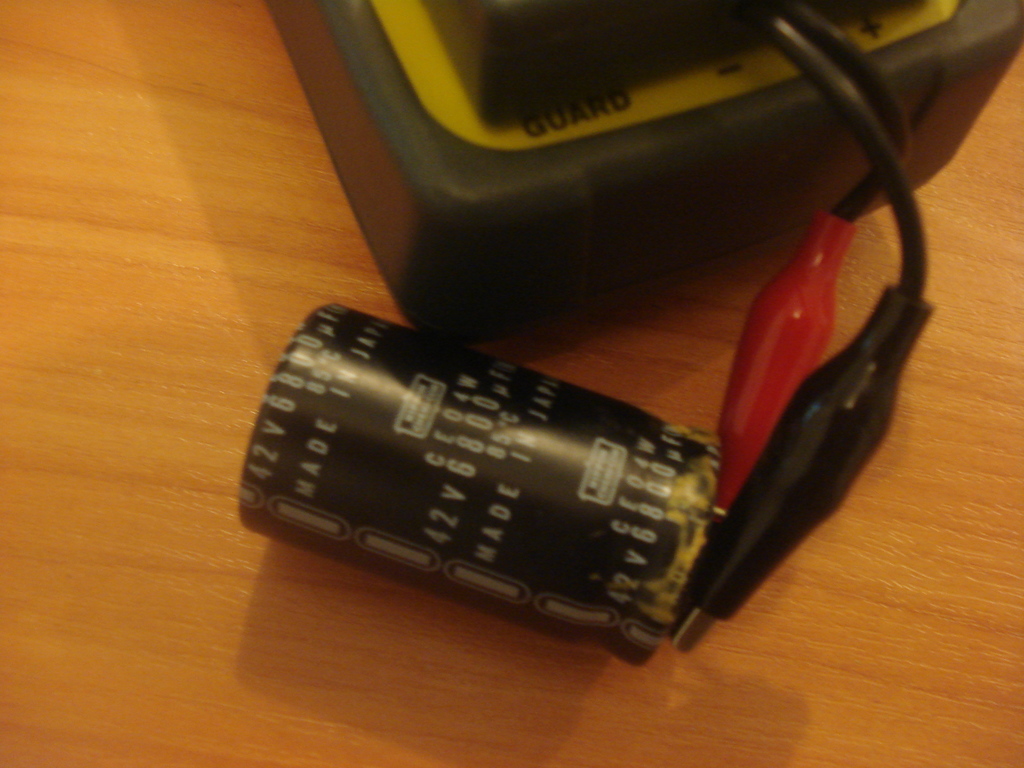
And here you can see all possible capacitor's parameters measured by the meter.
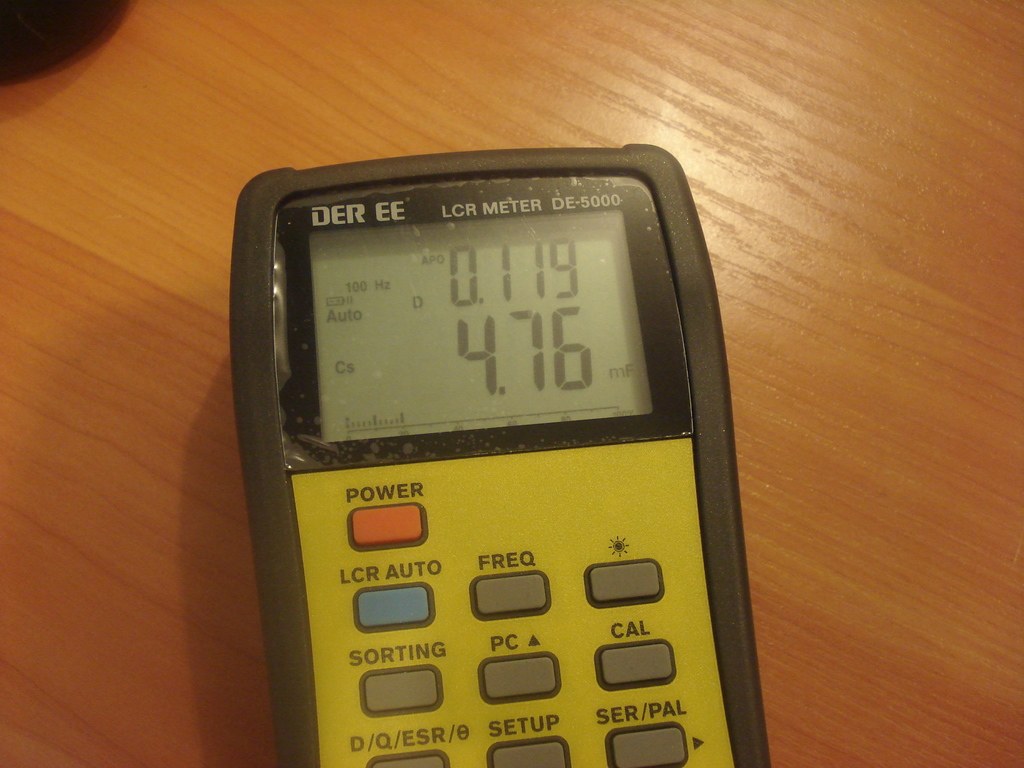

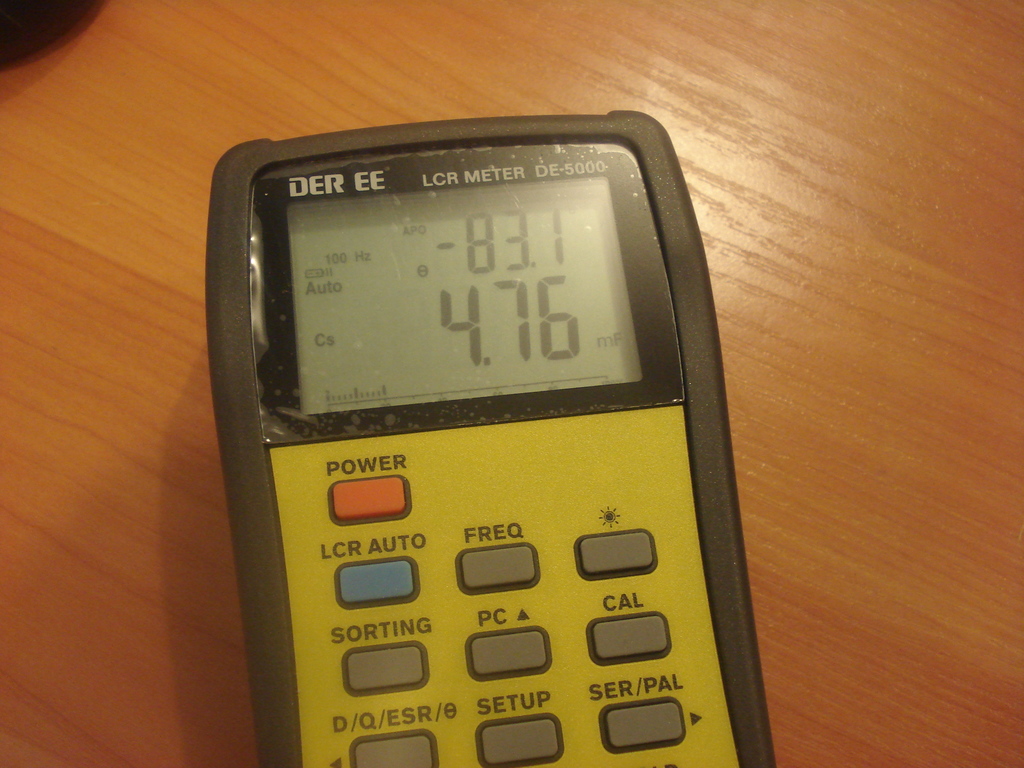
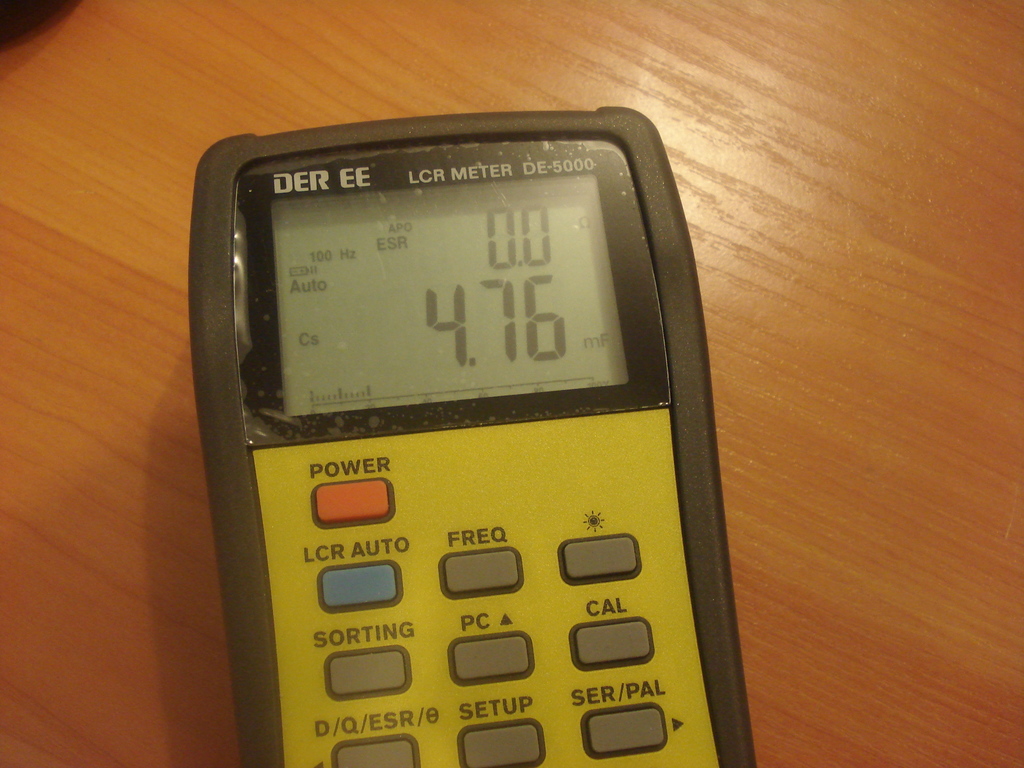
Well, you can see that in Cs mode and 100 Hz measuring frequency the measured ESR has meaningless value 0.0 probably due to the limited depth on 100 Hz.
If you try to increase the frequency and hence to raise the accuracy result is:
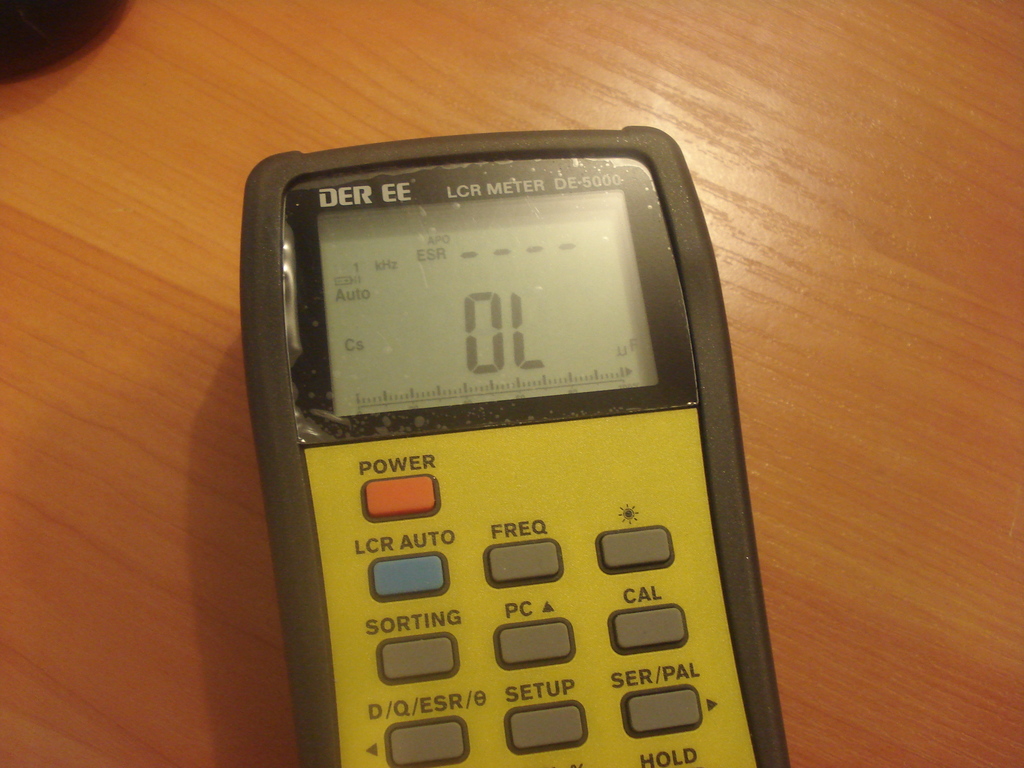
Initially I was disappointed by that but soon I think I found a solution to measure the ESR of big elcos - one possible solution is to change the mode to Ls:
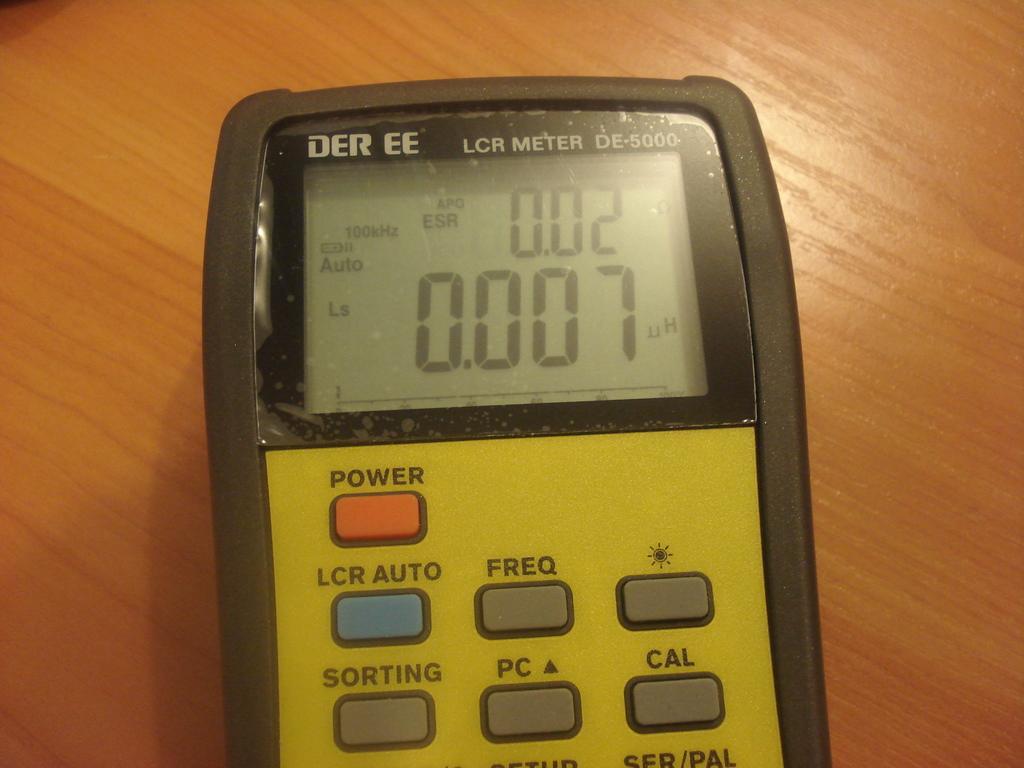
I'm not very sure if this is the proper mode for capacitors measurement but the results for ESR are consistent with the other mode one can use to measure ESR - Rs mode:
I'm interested if my observations are right.
And once again - I think it's the best unit for its price!
And here you can see all possible capacitor's parameters measured by the meter.
Well, you can see that in Cs mode and 100 Hz measuring frequency the measured ESR has meaningless value 0.0 probably due to the limited depth on 100 Hz.
If you try to increase the frequency and hence to raise the accuracy result is:
Initially I was disappointed by that but soon I think I found a solution to measure the ESR of big elcos - one possible solution is to change the mode to Ls:
I'm not very sure if this is the proper mode for capacitors measurement but the results for ESR are consistent with the other mode one can use to measure ESR - Rs mode:
I'm interested if my observations are right.
And once again - I think it's the best unit for its price!
...some pictures of measurement...
Thank you, that's exactly the sort of information I wanted, and pictures suit my bandwidth better than YouTube video.
The results all look quite reasonable except one that I am not sure.
I need to think about that low frequency measurement of the inductance of the capacitor, to understand why it is inconsistent.
Best wishes
David
...I'm interested if my observations...
Now that I think about it, that ESR is an anomaly.
If the unit can measure the impedance of the capacitor and the Q then it should be able to calculate the ESR.
Capacitance 4.76 uF at 100 Hz = .3 ohms
Divide by Q of 8.37 = ESR of 0.036 (approximately)
Which seems about correct, based on the other results.
(There's a small inconsistency between Q and D, presumably round-off)
So it has sufficient resolution of the Q or D or Theta to show milliohm variations in ESR, but doesn't. Hmm.
Best wishes
David.
Last edited:
- Status
- Not open for further replies.
- Home
- Design & Build
- Equipment & Tools
- Electrolytic capacitor ESR measurement